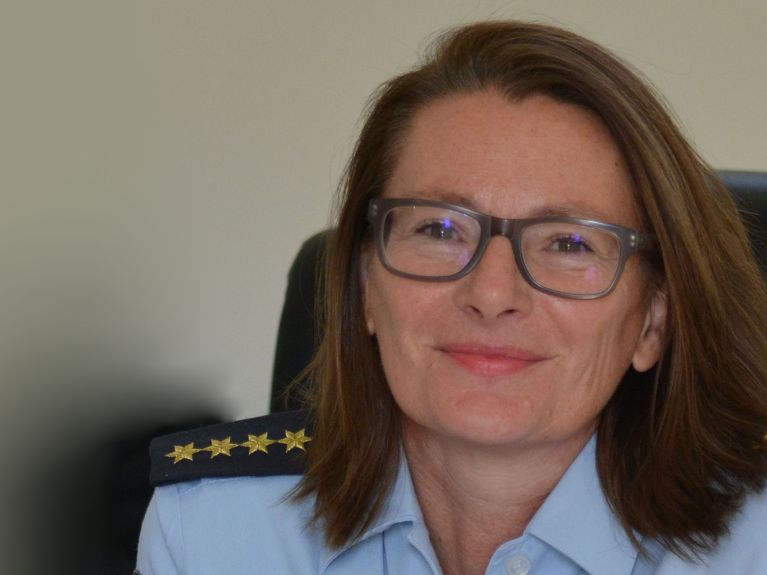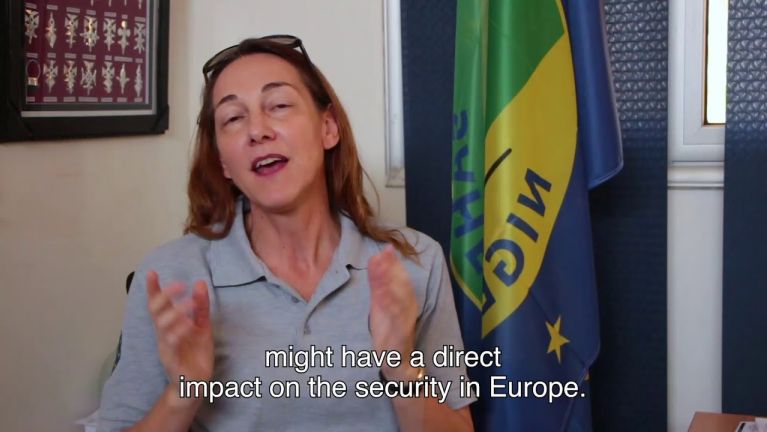“Really achieving something”
The German police officer Antje Pittelkau heads the EU mission in Niger.

“I often sit in large meetings and notice only at the end that I’m the only woman there.” Not a new experience for Antje Pittelkau; on the contrary, it has become habitual, says the policewoman who, in mid-January 2021, became the first German to lead an international police mission. “I’ve worked my entire professional life in male-dominated areas.” Hans-Georg Engelke, State Secretary in the Federal Ministry of the Interior, called the decision to appoint Pittelkau head of the international police mission of the European Union (EU) in Niger an “overdue step – a signal for Germany and the EU” – because women have rarely been assigned leading positions in international police missions. Pittelkau told us over the phone that she has received a lot of encouragement from the few women in the EU mission in Niger. Recently, someone even wrote to her describing how much she is seen as a role model. She herself, however, rarely poses the question of gender.
I was lucky to be able to go to Afghanistan in 2004.
That Pittelkau now runs a “medium-sized company” in the Nigerien capital Niamey, to use the comparison with which she describes her daily work at the top of the EUCAP Sahel Niger, goes back to a decisive turning point almost 20 years ago. “I was lucky to be able to go to Afghanistan in 2004”, says the 53-year-old police officer about her career. The Federal Ministry of the Interior asked her if she wanted to advise an Afghan general in the capital city of Kabul. Pittelkau agreed; the job felt “very good” and she ended up staying four years instead of the one year originally planned. After that, she says, “my wanderlust was awakened”. Since then she has mainly been working internationally.
Dieses YouTube-Video kann in einem neuen Tab abgespielt werden
YouTube öffnenThird party content
We use YouTube to embed content that may collect data about your activity. Please review the details and accept the service to see this content.
Open consent formPolicewoman on an international mission
In March 2018 Pittelkau moved to Niamey and became Deputy Head of EUCAP Sahel Niger. That is not the ideal time to move to the Sahel: between March and May, temperatures can rise to over 40 degrees Celsius. Nevertheless, Pittelkau now feels “really at home” in Niamey. She doesn’t feel a latent threat in the capital, although the security situation in Niger and the other Sahel countries has deteriorated drastically in recent months. The population suffers above all from attacks by Islamist terror groups from the neighbouring countries of Burkina Faso, Mali and Nigeria. The humanitarian situation in these countries is worsening faster than in any other hot spots in the world. Nine hundred thousand people from neighbouring crisis states have sought refuge in the three countries, and at the same time almost two million internally displaced people are looking for a reasonably safe place to stay.
Training for Nigerien security forces
With almost 200 employees from 16 member states at the beginning of 2021, the European Union is helping the Nigerien government to build up and strengthen its security forces. Pittelkau sees the cooperation among the European nations as exemplary, and in conversations she repeatedly uses the term “European family”.
The Europeans offer their Nigerien partners training and advice; the specific work is based on the needs and wishes of the Nigeriens. The focus is on the fight against organized crime and Islamist terrorism. In the Sahel in particular, the two are almost inextricably linked to the establishment of more effective border protection. Border control is also about managing migration, which has often been left regulated.
Commitment to human rights
According to Pittelkau, 19,000 women and men have taken part in training courses since the start of the EU mission in 2012. The training often includes basic knowledge such as the security of the officers themselves, access techniques for arrests, identifying forged passports, and human rights. The latter is an important issue because the Nigerien security forces repeatedly commit serious human rights crimes in their “fight against terror”. After particularly serious allegations, says Pittelkau, the Nigerien government approached the EUCAP Sahel in autumn 2020 and asked for further training in this area. “And that is one of the reasons I feel at home here: because you can have the feeling that you are achieving something.” The Nigerien partners really want to rectify the abuses.
Another important project from Pittelkau’s point of view is the establishment of a mobile unit for the border police. The new, very well trained and equipped unit is expected to move into its new headquarters in the Nigerian border area in the spring 2021.
You would like to receive regular information about Germany? Subscribe here:



